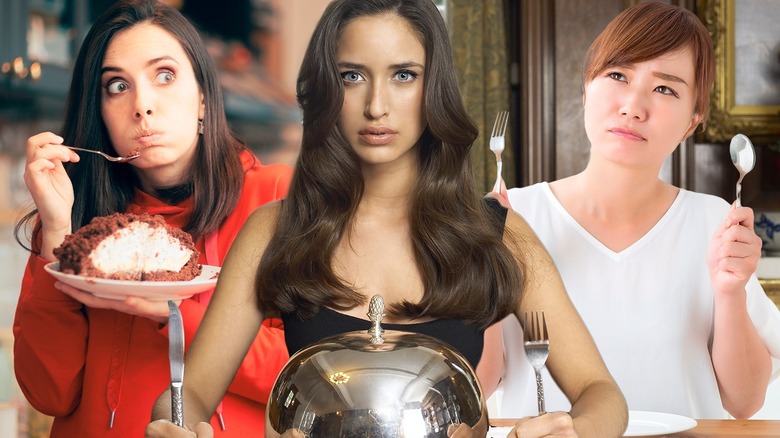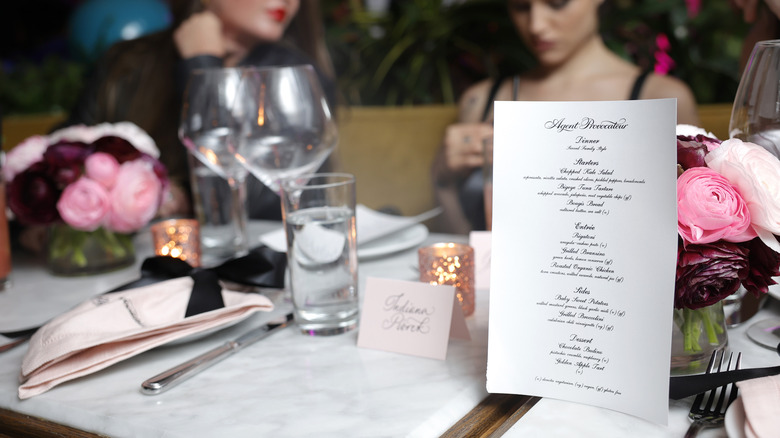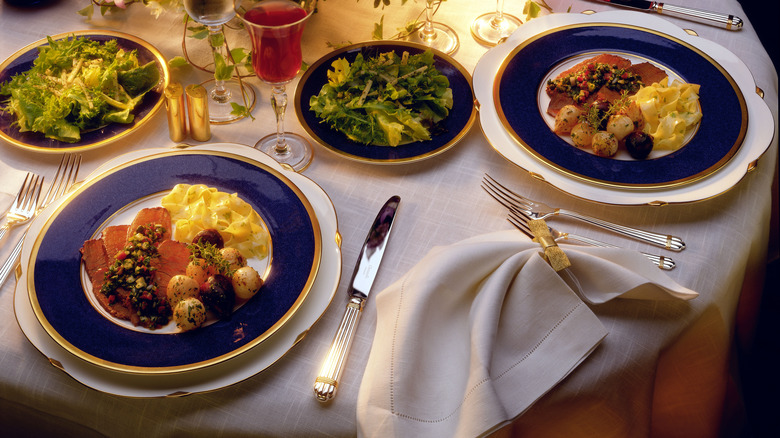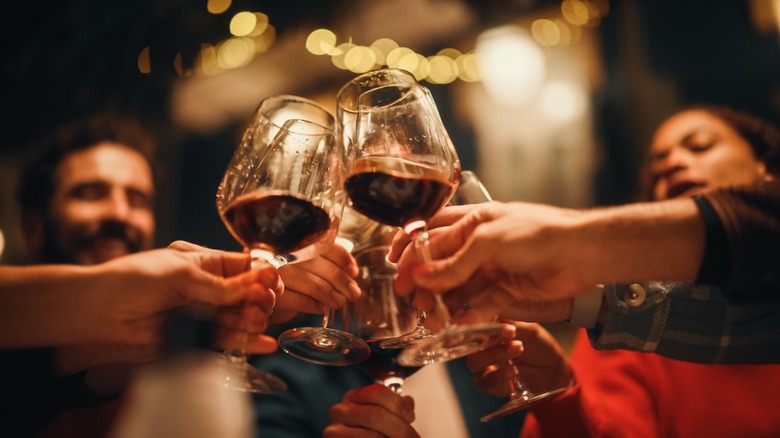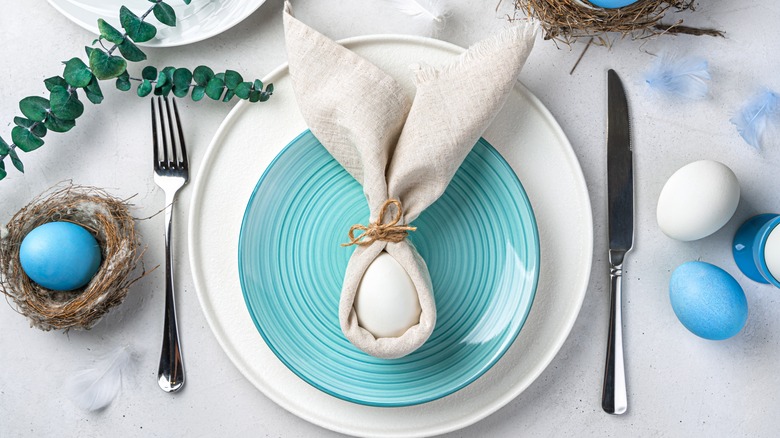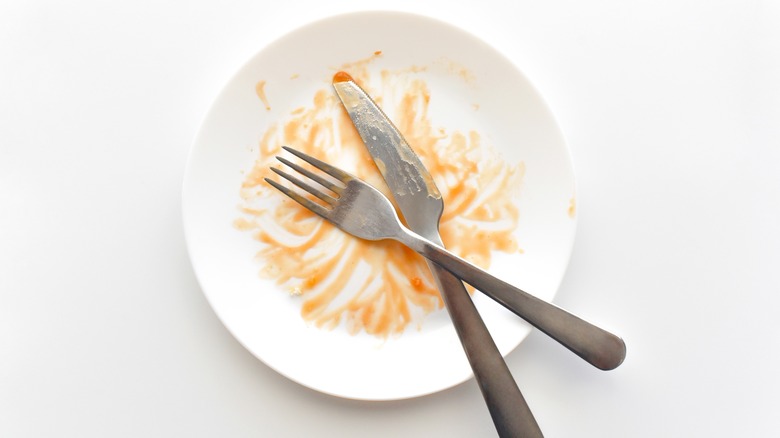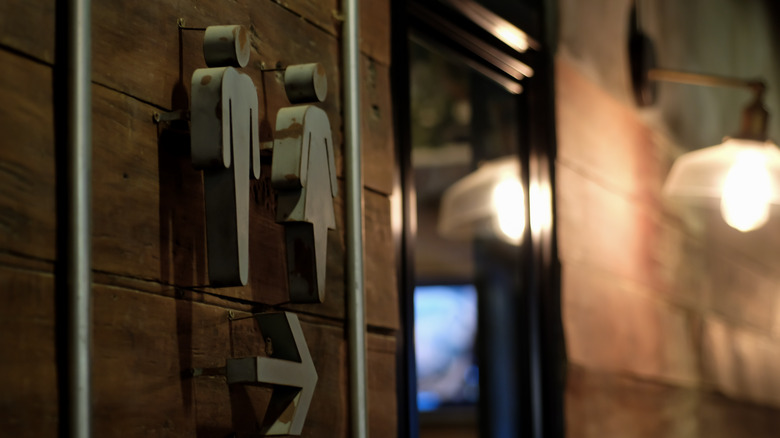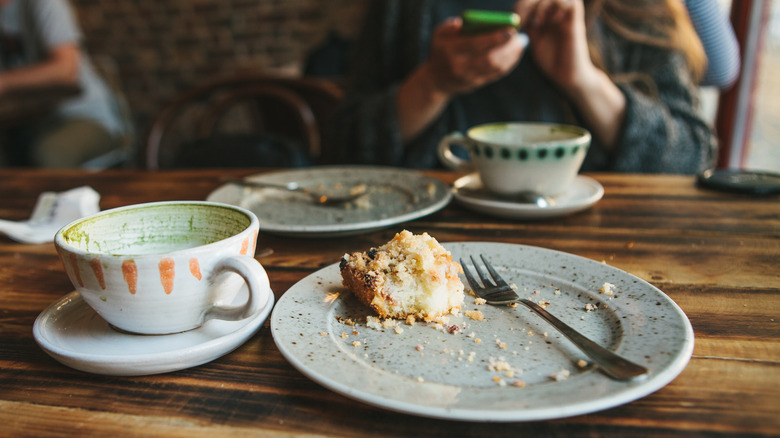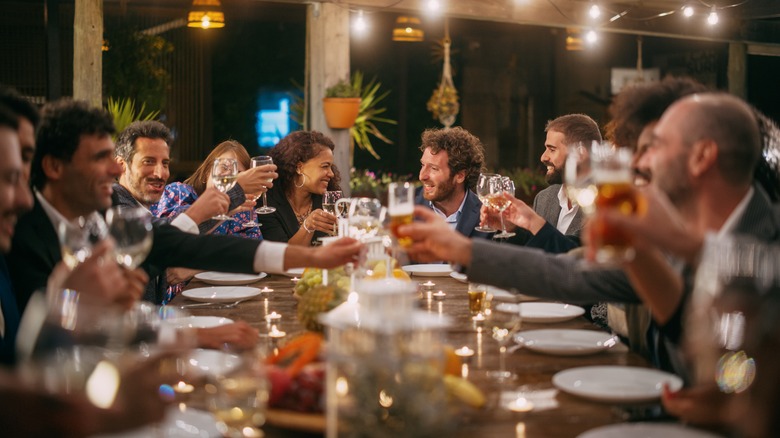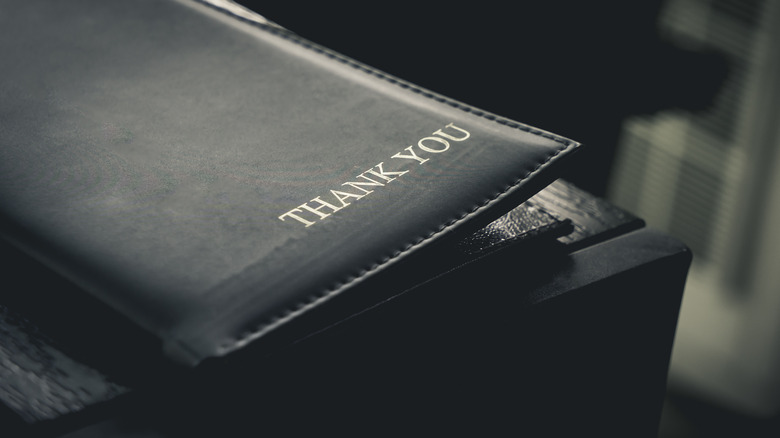12 Fine Dining Rules That Don't Really Make Any Sense
Going out to eat is supposed to be a joyful time when you can relax with friends, enjoy a great meal and fantastic drinks, and someone else cleans the dishes. At least, that should be the case! Somewhere along the way, rules changed — something that is especially true in the world of fine dining. Now, there are just as many "unwritten rules" for fine dining as there are for Major League Baseball. But what if those rules were deemed obsolete? How do you even begin to know which rules to follow? This list tackles these questions, so you don't have to feel so confused.
Rules are meant to be broken, and this list looks at 12 rules of fine dining that don't make sense. Read on to see why these rules shouldn't be followed as they can potentially eliminate the enjoyment that should come with eating an expensive meal. Your focus should be on the moment, so ignore these rules and take in a well-earned meal without judgment.
Dress codes are outdated
What to wear to dinner is a question that makes most people panic. Finding the right outfit can be a challenge, but it should not get in the way of you enjoying a night out of fine dining. However, that isn't always the case. A dress code should not get as much consideration as it does today.
Now, it goes without saying, don't show up to an establishment wearing your worst items. While dress codes sometimes limit access to locations, there should be some achievable standards in place. Be presentable. But that doesn't mean you have to always wear your finest threads for a night out and a good meal.
If you're unsure of what to wear, the best bet is to visit a restaurant's website or call the location to learn if there's a mandatory dress code. If the rules are too stringent, take your business to another location. Some locations discriminate based on dress code, which is the main reason why they shouldn't be so strictly followed.
Never lift your menu off the table
This is one of the most random rules on this list. While it may be understandable to have rules around how items are ordered off the menu, the idea that the menu must always touch the table is odd. This doesn't mean that the menu must always remain flat, but some portion of it should touch the table. The bottom corner can stay on the table while reading it to make your selection.
But what if you're someone who has a vision problem that makes it hard to read the print? Or what if you have posture issues that make it hard for you to lean forward to see everything available? These are two quick reasons why this is a rule that doesn't really have a place in fine dining establishments today. Don't worry about leaning the menu on the table and breaking some unwritten rules. Pick up the menu, flip through its pages, and read as much as you like because this is your experience to enjoy.
Order the same amount of food as others
You're at the table, holding the menu. You've already broken the rule about keeping the menu on the table. But did you know there's another rule that demands you order the same amount of food as your company? This is yet another obsolete rule that takes a level of enjoyment right out of the experience that you're paying to have.
You shouldn't have to commiserate with your friend or partner about how much food they are ordering before deciding what you want. See an appetizer you want to taste? Order it. Still hungry after the meal and want to try a dessert? Order that, too! Following this rule puts you in a position to miss out on aspects of the experience that comes with fine dining, and that is enough of a reason to deem this rule obsolete. You may even convince your company to get more off the menu to satiate their taste buds as well!
Don't ask about the cost of wine
Having a glass of wine is an expected part of a fine dining experience. Many locations pride themselves on their vast and global wine selection. However, there's a rule that tells patrons to not ask about the price of wine. But that's also a rule that should be ignored.
A customer shouldn't be judged for wanting to know an item's price. Waiters are expected to push patrons toward the higher-priced options on the menu — as it gives them a higher chance of a larger tip. This is an understandable practice for the restaurant, but not something that customers should be expected to just accept. Ask how much the bottle of wine will cost to ensure it is within your budget. Fine dining is more expensive today than in decades, so if that means you must drink cheaper wine for your budget, don't be ashamed to ask the server about prices.
Drink from the same spot on the glass
So you've placed your order and the waiter arrives with what you hope is an excellent wine choice for your meal to come. You take a sip and are excited to discover that your expectations were met. But did you know that the next rule calls for you to drink from the same exact spot on that glass until your drink is complete? This rule is meant as a way to help drinkers avoid lip rings or other marks that may come from lipstick and similar products on their glass. But like other decorum rules on this list, it invites eaters to feel self-conscious during a celebratory time.
Enjoy the drink and the camaraderie captured at the moment. Checking your glass to make sure you're drinking from the same spot each time is a waste of energy. Instead, dedicate that thought to paying attention to your company.
Using your napkin at dinner
The napkin plays an important part in your meal and it has an unwritten rule all its own. Many know about the practice of placing your napkin on your lap before diving into the plate. But did you know that the napkin should be specifically folded with the crease facing you? As with many rules on this list, this is another one that does not make any sense. No one is paying attention to your lap. Enjoy the meal! Hopefully, you will not need to use the napkin other than to clean your fingers from time to time.
There are other rules when using the napkin, too. For example, leaving the napkin on your chair tells the waiter that you're still working on your plate. Leaving the napkin on the table lets the waiter know that you're done and they can take the plate away. This is an important designation because no one wants to return to the table and find their plate cleared. Don't forget to pinch your napkin when picking it up and placing it down!
Keeping your plate organized
There are multiple rules around keeping your plate organized amidst a fine dining experience. For example, your bread should never leave your plate — unless you're taking a bite out of it. Any discards from your meal should stay in the upper left-hand area of your plate. Also, keep the rim of your plate clear of any debris from the meal.
At their core, these fine dining rules do make sense. But when you try to meet all of these demands, these rules make the overall experience of eating out less enjoyable. Instead of focusing on where each morsel goes on the plate, have a good time and enjoy your meal! No, we're not advising you to make a mess at the table. It is still polite to pick up after yourself a bit — especially if you do accidentally make a mess. But worrying about putting your food in specific spots on the plate is overkill.
Never say you're going to the restroom
There may be a moment during the dining experience when you need to excuse yourself from the table. You might receive an urgent work or personal phone call to attend to or you might have to go to the restroom. But during a fine dining experience, you're not supposed to say exactly why you are stepping away from the meal — especially if it is to go to the bathroom.
Why wouldn't you explain why you're leaving the table? Some believe it's rude to address who else you're giving your attention to instead of them. Others warn that it's not polite to conjure up visuals of bathroom images while eating. To be frank, those reasons feel immature. In today's age, it is best to let those in your party know when you are stepping away. Also, it increases your safety if guests know where you're going and how to find you. Don't be afraid to excuse yourself and be sure to let your company know where you are headed.
Watch your posture and elbows
This tip will immediately cause you to have flashbacks of your mother yelling at you to "get your elbows off the table!" Yes, posture is important for your bone health and sense of confidence. But going on a trip or out for fine dining should be an opportunity to relax. If that means breaking the rules about posture at a dinner table, go for it!
Put your elbows on the table if you need to lean closer to someone — especially if the conversation is private. Sit back in the chair to relax a bit after a great meal and drinks. You don't need to maintain posture like you are at a job interview the whole time. Take a deep breath and relax from thinking about your posture. Days are stressful enough without needing to also worry about your body positioning during a night out on the town. However, don't do anything drastic or offputting like putting your feet up on the table.
Leave one bite on your plate
"Cleaning your plate" is a practice many people trace back to childhood. It is something that adults may take to heart as well. In some cultures, it's offensive if you don't eat every bit of the meal in front of you. However, there's a rule in fine dining that counters this idea. In that world, it's customary to leave one bite on your plate.
As with some of the other obsolete rules on this list, this rule forgets that your enjoyment of the experience trumps decorum. If you want to eat every bite of a meal you're paying for with your hard-earned money, then do so! If someone perceives that as rude, make it clear that you deserve to enjoy the experience that you're paying to have. Eating out is becoming more expensive as the day passes, and as prices rise do not worry yourself about this or other rules on this list. Enjoy every bite because you deserve it.
Keep the dinner conversation light
This is an interesting but understandable rule on the list. The conversation around dinner is a great part of the experience. Sitting down to talk with friends and family should be enjoyable. But what about when those discussions touch on some of the harder topics to cover like romantic relationships or political views? Should you turn the conversation back to something more "light?" Well, that depends on your reading of the situation. But at the end of the day, this rule doesn't need to be fully followed — especially if you're close enough with friends to discuss these topics.
It's possible to have a mature conversation while honoring differing opinions. If you're afraid of those conversations becoming "hard" at the dinner table, perhaps those are not the people you should speak about these issues with at this time. There's no need to avoid discussing controversial topics as long as things stay respectful to those at the table and in the restaurant, too.
Handling the check
This is the big one. Who pays for the meal? Can you split the check across multiple people? Take a look on social media and you'll see this is an often debated topic. There was a time when the eldest man at the table was expected to pay for the meal or checks were to be split by what you ordered only. Those times are long gone and the rules have shifted.
First, no one person should be obligated to pay for the check every time. Discuss with your partner who will cover the check for that outing. Whatever works best for your relationship should be the solution to the problem of handling the check when it's time to eat out.
Splitting the check across multiple people becomes more complicated. Many restaurants no longer allow this practice. Customers receive one check, so it's easier on the server's end to handle. Also, breaking down checks by what each person ordered individually is a daunting task for servers. If possible, split the check evenly across everyone in attendance. If that's not possible, discuss with your guests ahead of time how they prefer to handle the bill.
